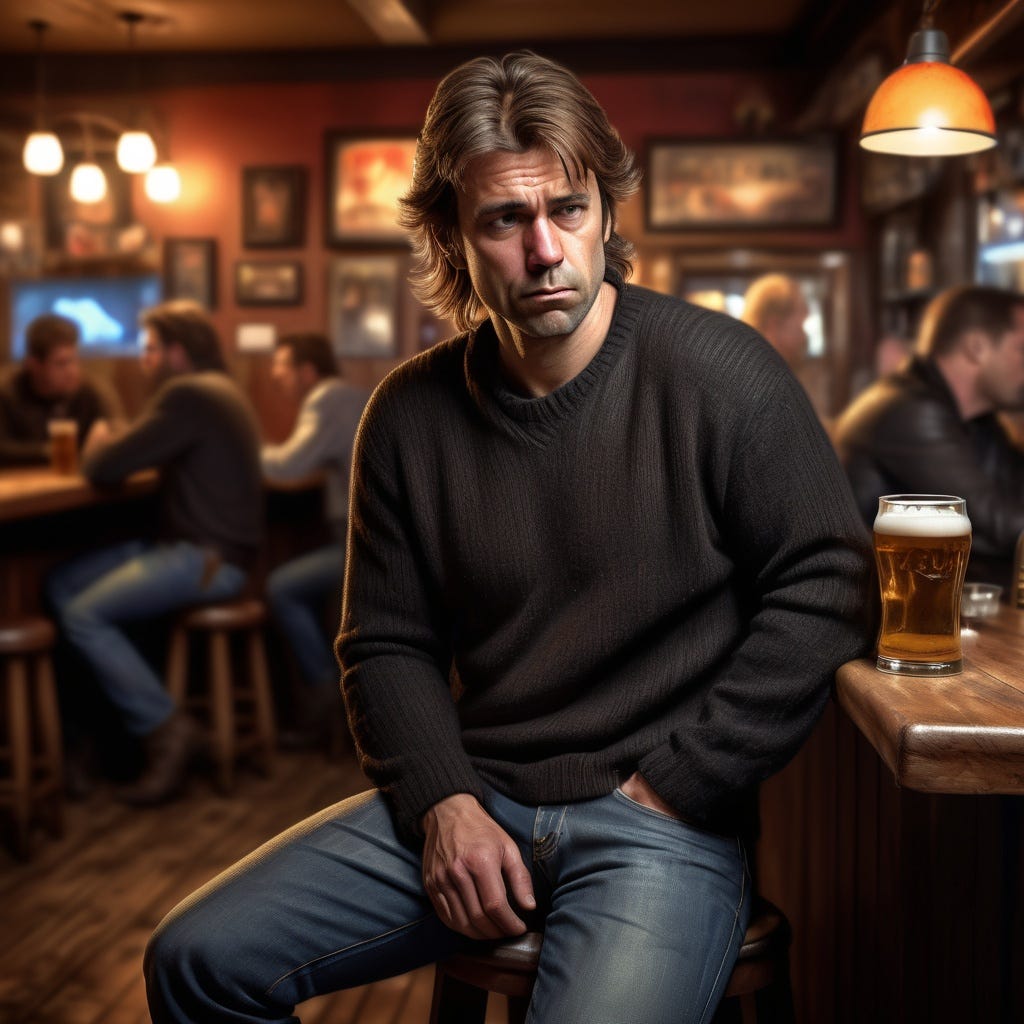Montreal, July 2027
Jan’s situation wasn’t getting any better. Since his forced leave, he spent his days at the Mi-Jo bistro, a dive where the neighborhood’s lost souls gathered. By 2 p.m., five or six of them were slumped at the bar, beers in hand, debating the “top ten ways to ruin your life.” As if their past miseries weren’t enough, they rehashed them for an audience of fellow drifters. Most of these layabouts were in their forties or early fifties, resigned to their fate. The barmaid, a curvy blonde named Joanne, acted as a lightning rod for the nonsense that filled the air. She had a rare gift for bringing order to their chaos, an emotional intelligence that went beyond mere understanding. Her listening ear was as vast as the Olympic Stadium, and most took advantage of it—except Jan. He was sparing with words, uneasy under Joanne’s gentle probing. Yet she had grasped the core of his anguish: a shattered childhood, a forgotten boy, a past that haunted him.
“Wouldn’t you like to make the most of your retirement? Travel, fish, discover something beyond Mi-Jo every day?” she asked one day, a glimmer of hope in her eyes.
Jan took a deep breath, his gaze shifting to Gilles, the man sitting beside him.
“What about you, Gilles? Don’t you want to go fishing at Beaver Lake this afternoon? What are you doing here, wasting your life?” he shot back, a hint of provocation in his voice.
Gilles mumbled an inaudible reply. Joanne, as always, flashed a smile and kept serving her regulars. Jan stared at her, a mocking expression on his face, as if to say, “I’m the one in charge.” He hated being told what to do or think.
To pass the time, Jan had invented the AEMS in his mind—the Association of Children Mistreated by the System. As a fictional member, he granted himself immunity for the punishments he dreamed of inflicting on “criminals”—killing an abuser or a child predator without facing justice. His mind brimmed with dark optimism. He had conjured up an imaginary tribunal that defended the downtrodden, the crooks, the broke. Joanne held an honorary role in this world he’d built.
“Last time, you mentioned your childhood… a little,” Joanne ventured gently. “You said that at 10 years old, you felt excluded, trapped in your own body. But you didn’t finish your story.”
She poured a beer for Gilles and waited for a response. Jan, suddenly serious, stayed silent, his face closed off.
“That must have been awful, that feeling,” she pressed, her tone kind but insistent. “At 10, a boy should be having fun, laughing with friends, getting into mischief…”
She noticed Jan shutting down, retreating like an oyster. In a clumsy move, she served Gilles his beer, spilling half of it on the counter. Gilles smiled, Joanne apologized, flustered. Jan pulled out a 20-dollar bill, tossed it on the bar, and left abruptly.
Joanne was used to his mood swings. This one was relatively tame: nothing broken, nothing smashed. This side of Jan fascinated her. In those moments, he reached the brink of what he could bear. His fragility nearly broke him, plunging him into a chasm of distress, a deep pain, a fractured soul. Jan’s raw authenticity moved her deeply.
Every time he left Mi-Jo, Jan felt the same way: he’d never set foot there again. It was as if he’d just spent two hours in Ali Baba’s cave, debating nothingness with Neanderthals.
“Hello?” he answered, picking up his phone just before starting his car.
“What? Why? When? Fine!” He hung up sharply. It was Labo, his former boss at the Sûreté, who needed to see him urgently to “close an incomplete file,” he’d said. Who could it be about? Jan owed them nothing. They’d kicked him out like a mangy dog, without recognition or thanks. Sure, he wasn’t blameless, but who was in that corrupt, miserable field? “They can go to hell!” he muttered to himself, seething. Yet beneath his bravado, his confidence wavered, a flicker of doubt creeping in. Anxiety always surfaced when authority came knocking. That fear never did him any favors. As tall and strong as he appeared on the outside, he trembled deep within. He let the tortured, suffering face of his childhood take over, tearing down what little confidence he had left. He often practiced his expressions in front of the mirror: brows and forehead slightly furrowed, but not too much, to avoid smiling. But it was his eyes that struck fear—a hollow, piercing stare, held indefinitely, straight into the other’s gaze. A surefire weapon. But at what cost? If he struggled to speak, to defend his ideas, to stand like a man, it was because he couldn’t. A coward in a gorilla’s body. How had he managed to do this demanding, complex job for twenty years? Part of the answer lay in his constant companion, his best friend: his Glock 45. That gun was an extension of himself. It spoke for him; its bullets were his words, his language—a universal language that granted him power. That was what being Jan meant: a duality he had carried his whole life, balancing between the gun and the crutch, between outward strength and inner weakness, a chameleon adapting to the world around him.
He constantly battled his demons. Retirement, he knew, wouldn’t fix things—not unless he made drastic changes. In his mind, there were only two options. The first: therapy. Out of the question. “Not at 40!” he told himself fiercely. The second: a return to his roots, to the scene of his past, to relive those painful moments and try to make sense of them. To speak with people—uncles, aunts, cousins—who might shed light on those tragic events. But that night, the bottle slipped from his bed, and Jan slipped back into sleep.
Upon waking, he pinched himself, grasping the weight of the moment. Returning to New-Danemark had always seemed impossible. Why, suddenly, did he feel compelled to confront the place where his life had unraveled? Why visit that earthly hell when nature, hunting, and fishing beckoned? As he prepared his coffee, a thought struck him. A few years earlier, an uncle had written to him. He opened his desk drawer and, amidst a pile of papers, found a sealed letter. His eyes devoured the words, searching for answers. Étienne Bérubé, his mother’s younger brother, wanted to see him, to talk. He wrote that he understood what had really happened during those cursed years, that Jan didn’t have to carry the burden of guilt for the rest of his life. At the bottom, an address and a phone number. Jan folded the letter carefully, as if it were a fragile treasure. He added a sugar and a splash of milk to his coffee. By the third sip, he cleared his throat. This morning of forced retirement would be different. The time for reconciliation had come.
If the story speaks to you, consider subscribing to my paid account — or alternatively:




